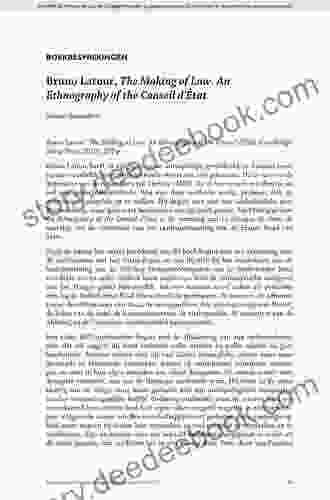The Making of Law: An Enduring and Intricate Process

Law, an indispensable aspect of organized societies, serves as the framework for regulating human behavior, safeguarding rights, and resolving disputes. The making of law, a complex and enduring process, involves a multitude of actors and stages, from the initial conception of a law to its eventual enactment and interpretation. This article delves into the intricacies of lawmaking, exploring the roles of legislators, stakeholders, and the courts, as well as the factors that shape the development and interpretation of laws.
The genesis of a law often lies in the identification of a societal problem or need. Stakeholders, such as citizens, interest groups, or government agencies, bring these concerns to the attention of legislators. Legislators, elected representatives of the people, play a pivotal role in translating these concerns into potential laws. They draft bills, formal proposals that outline the proposed law's provisions and objectives.
Once a bill is introduced, it embarks on a journey through legislative committees, where it is scrutinized and amended. Committees, composed of legislators specializing in relevant policy areas, hold hearings, gather expert testimony, and debate the bill's merits and potential implications. The bill may undergo significant revisions during this process, as legislators seek to refine its language, address concerns, and balance competing interests.
5 out of 5
| Language | : | English |
| File size | : | 3253 KB |
| Text-to-Speech | : | Enabled |
| Screen Reader | : | Supported |
| Enhanced typesetting | : | Enabled |
| Word Wise | : | Enabled |
| Print length | : | 312 pages |
| Lending | : | Enabled |
After committee deliberation, the bill is presented to the full legislative chamber for a vote. If it receives majority support, it moves to the next chamber for further consideration. In bicameral legislatures, the bill must navigate both chambers, with potential amendments and negotiations along the way. Only after passing both chambers does the bill proceed to the next crucial stage: executive approval.
The executive branch, headed by the President or Prime Minister, plays a significant role in the lawmaking process. The President has the authority to sign the bill into law, effectively making it legally binding. However, the President may also choose to veto the bill, expressing disapproval and preventing its enactment. In some cases, the legislature can override a veto with a sufficient majority vote.
Once enacted, a law may face scrutiny in the courts. Through the process of judicial review, courts interpret the law's meaning and assess its constitutionality. If the court finds the law to be unconstitutional, it may declare it invalid and unenforceable. Judicial review serves as a crucial check on legislative and executive power, ensuring that laws comply with fundamental legal principles and constitutional rights.
In many legal systems, courts rely on the doctrine of legal precedent, also known as stare decisis. Under this doctrine, courts are bound by the decisions of higher courts in similar cases. This principle promotes consistency and predictability in the interpretation and application of the law. Over time, a body of legal precedent develops, shaping the contours of the legal landscape.
The making of law is influenced by a multitude of factors, including:
The making of law is a dynamic and evolving process, reflecting the ever-changing needs and complexities of society. From the initial identification of a societal problem to the final interpretation and enforcement of a law, the process involves a multitude of actors, stages, and influences. Legislators, stakeholders, the executive branch, and the courts all play vital roles in shaping the legal landscape, balancing competing interests, and ensuring that laws are just, effective, and consistent with fundamental rights and principles. As societies continue to evolve, so too will the laws that govern them, reflecting the ongoing pursuit of justice, order, and the betterment of human lives.
5 out of 5
| Language | : | English |
| File size | : | 3253 KB |
| Text-to-Speech | : | Enabled |
| Screen Reader | : | Supported |
| Enhanced typesetting | : | Enabled |
| Word Wise | : | Enabled |
| Print length | : | 312 pages |
| Lending | : | Enabled |
Do you want to contribute by writing guest posts on this blog?
Please contact us and send us a resume of previous articles that you have written.
 Book
Book Chapter
Chapter Genre
Genre Reader
Reader Library
Library E-book
E-book Magazine
Magazine Sentence
Sentence Bookmark
Bookmark Glossary
Glossary Bibliography
Bibliography Foreword
Foreword Preface
Preface Annotation
Annotation Scroll
Scroll Tome
Tome Bestseller
Bestseller Classics
Classics Biography
Biography Memoir
Memoir Reference
Reference Encyclopedia
Encyclopedia Thesaurus
Thesaurus Narrator
Narrator Character
Character Catalog
Catalog Borrowing
Borrowing Archives
Archives Periodicals
Periodicals Scholarly
Scholarly Lending
Lending Reserve
Reserve Academic
Academic Journals
Journals Rare Books
Rare Books Interlibrary
Interlibrary Thesis
Thesis Dissertation
Dissertation Storytelling
Storytelling Awards
Awards Shannon Boodram
Shannon Boodram Hugh Rowland
Hugh Rowland Martha Deeringer
Martha Deeringer Karol Bednarski
Karol Bednarski Arron Banks
Arron Banks Ed Sealover
Ed Sealover Todd Boyd
Todd Boyd Joan West
Joan West David Huckins
David Huckins Klaus Metzger
Klaus Metzger Wolfgang Gabler
Wolfgang Gabler Jane A G Kise
Jane A G Kise William Shakespeare
William Shakespeare Fred W Frailey
Fred W Frailey Nicholas Starks
Nicholas Starks Brad Jones
Brad Jones Julia Mills
Julia Mills Keith Hall
Keith Hall Patricia J Fanning
Patricia J Fanning Martha C Nussbaum
Martha C Nussbaum
Light bulbAdvertise smarter! Our strategic ad space ensures maximum exposure. Reserve your spot today!

 Elmer PowellThe World According to Danny Dyer: A Review of the Popular British Reality...
Elmer PowellThe World According to Danny Dyer: A Review of the Popular British Reality... Lucas ReedFollow ·16.6k
Lucas ReedFollow ·16.6k Eddie BellFollow ·15.7k
Eddie BellFollow ·15.7k Lawrence BellFollow ·2k
Lawrence BellFollow ·2k Bernard PowellFollow ·9.5k
Bernard PowellFollow ·9.5k Guy PowellFollow ·16.5k
Guy PowellFollow ·16.5k Michael SimmonsFollow ·5.6k
Michael SimmonsFollow ·5.6k Craig BlairFollow ·7.6k
Craig BlairFollow ·7.6k Garrett PowellFollow ·18.1k
Garrett PowellFollow ·18.1k

 Matt Reed
Matt ReedTrekking the Breathtaking Scotland Coast to Coast Trail:...
Lace up your...

 Deacon Bell
Deacon BellThe Easy Guide to Playing Piano Scales: Piano Lessons for...
Piano scales...

 Fred Foster
Fred FosterUnveiling the Enthralling Best Friends to Lovers Romance...
Westbury Warriors: Where Love...

 T.S. Eliot
T.S. EliotHow To Dramatically Increase Your Profits And Sales...
Are you looking...

 Aaron Brooks
Aaron BrooksSummer at Stallion Ridge by Delores Fossen: A Thrilling...
Immerse Yourself in the...
5 out of 5
| Language | : | English |
| File size | : | 3253 KB |
| Text-to-Speech | : | Enabled |
| Screen Reader | : | Supported |
| Enhanced typesetting | : | Enabled |
| Word Wise | : | Enabled |
| Print length | : | 312 pages |
| Lending | : | Enabled |












